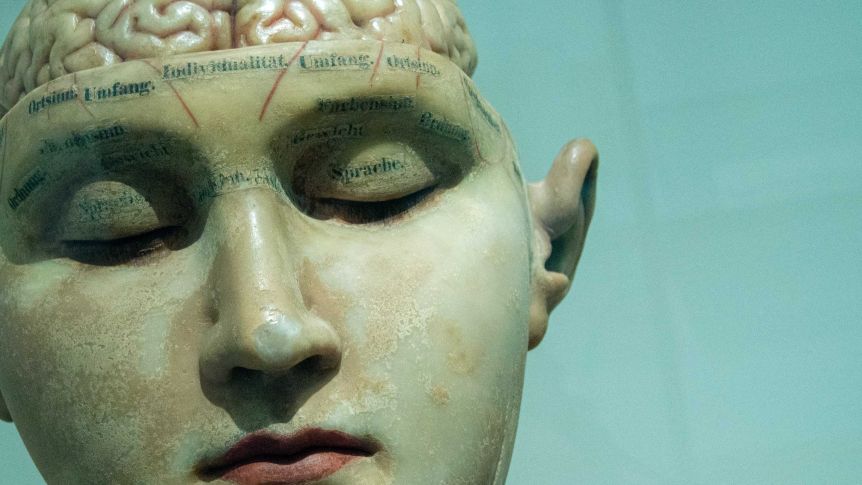Despite frequent critiques, psychiatry’s brain disease model and its heavy reliance on psychotropic drug treatments continue to dominate the public discourse on mental health. In a perspective piece published in the Harvard Review of Psychiatry, researchers Estelle Dumas-Mallet and Francois Gonon describe how the misleading brain disease model comes to be exaggerated and sold to the general public.
Reviewing a broad range of studies, they show how biomedical observations get misrepresented, embellished, and subject to publication bias, fostering public narratives that harm patient outcomes and overshadow effective psychotherapeutic and social approaches to mental health.
In an email communication with Mad in America, the authors explained that they were prompted to write the piece by signals that academic psychiatry was prepared to reflect on these misrepresentations and change course. Francois Gonon explained:
“There is, indeed, a doublespeak of biological psychiatry and that it negatively affects patients’ care. My colleagues and I have worked for ten years to describe the misrepresentations of biological psychiatry in the mass media. However, the major event that prompted us to write our perspective article is the publication of the opinion letter by Gardner and Kleinman published on October 31, 2019, in the New England Journal of Medicine. For the first time in a prestigious medical journal, the doublespeak of psychiatry was acknowledged… In our article, we review the academic literature showing how and why this doublespeak is generated. We also discuss to what extent it negatively affects patients’ care, especially social prevention of mental disorders.”

In the earlier piece that they reference (see MIA’s summary), a psychiatrist and prominent medical anthropologist, both from Harvard University, wrote in the New England Journal of Medicine:
“Ironically, although these limitations [of “biologic treatments”] are widely recognized by experts in the field, the prevailing message to the public and the rest of medicine remains that the solution to psychological problems involves matching the ‘right’ diagnosis with the ‘right’ medication. Consequently, psychiatric diagnoses and medications proliferate under the banner of scientific medicine, though there is no comprehensive biologic understanding of either the causes or the treatments of psychiatric disorders.”
The limitations of predominantly neurologic and biologic approaches to mental health have been well documented and discussed throughout the scientific literature. However, these limitations have mostly failed to alter the prevailing public messaging about psychological maladies.
The common narrative suggests that solving mental health issues starts and ends with matching scientifically-validated diagnoses with corresponding psychotropic medications. This narrative remains intact, even as prominent psychiatrists are beginning to publicly acknowledge that neurobiological understanding of psychiatric disorders has not yet translated into better care for patients. Similarly, neuroscientists have challenged the viability of prevailing methods in the field and have argued that we stand to learn as much about human cognition from classical behavioral studies as we do from neuroscientific research.
Moreover, public messaging continues to overstate the progress of biological psychiatry. The authors argue that this is an effect of dissemination bias, where only statistically significant results are published. Given the steady dose of indignation this problem doles out to those acquainted with the problem, messaging gaps are often explained by referencing outright fraud or malfeasance. But a more systemic, multi-causal explanation may be needed to bring about change.
Dumas-Mallet and Gonon explain how misleading messaging is generated through a system that prioritizes various actors and institutions’ interests across research and publication processes. They review academic studies the demonstrate the prevalence of misrepresentation and bias in the scientific literature. Misrepresentations in the scientific literature are promoted as significant findings, are released to the press, and amplified by the short attention spans of mass media outlets.
First, the authors describe the misrepresentations of the scientific observations already present in the biomedical literature, focusing on psychiatry. Data embellishment, sometimes called “p-hacking,” involves falsification aimed at generating significant results through data deletion, alteration, collection termination, or statistical manipulation. Such embellishment is incentivized for researchers in a culture of academic competition. For example, prominent journals favor positive studies, and these publications are needed to secure future funding and move up within the academic research hierarchy. The authors explain:
“The percentage of scientific articles reporting results that confirmed researchers’ hypotheses increased from 70% in 1990 to 86% in 2007, with psychiatry and psychology showing the highest positive outcome rate of all scientific disciplines under review.”
Other problems include inaccurate or vague descriptions of methods, which is highly problematic. These descriptions crucially affect others’ ability to judge the validity of the results or attempt to replicate the finding. Misrepresentation is also common throughout the literature. The authors point to several instances where there were obvious inconsistencies between the actual study results and the conclusions drawn at the end.
For example, “a brain-imaging study published in 2017 reported that some subcortical brain areas are smaller in patients with ADHD. The largest difference between patients and controls was related to the volume of the amygdala, and it was much smaller (mean difference = 1.5%) than the natural variability within healthy controls (SD = 9.4%). The authors concluded that ‘our results confirm that ADHD patients truly have altered brains, i.e., that ADHD is a disorder of the brain.’ (see MIAs coverage of this controversial study)
There are also issues related to mass media coverage of biomedical and biological psychiatric research. When distortions are present in the scientific literature, they are easily spread to the public by time-pressed journalists. Press releases are promoted by scientific institutions to hype these studies, and the claims made in the releases are often copied wholesale into mass media coverage. Journalists preferentially cover initial studies and follow corresponding press releases closely and consistently fail to report the limitations and uncertainties of the results.
In a comparative study of 663 initial studies associating a risk factor with a pathology, an average of one in two initial studies “was either contradicted or strongly attenuated by the corresponding meta-analysis.” Nevertheless, the public is seldom informed of research disproving initial studies, and reductionist theories are not met with existing contrary evidence. In another example, only 4 of 50 newspapers covering a story on genetic susceptibility to depression also reported a later meta-analysis that disconfirmed its results.
These misrepresentations are not just inaccurate. They also affect patient care by increasing stigmatization that, in turn, negatively affects prospects for healing and recovery.
“Indeed, the percentage of American people who are convinced that schizophrenia and depression are genetic brain diseases increased from 61% in 1996 to 71% in 2006,” the authors write. “Although laypeople adhering to this belief tend to blame patients less for their symptoms, they perceive them as more dangerous and are more pessimistic about a possible recovery.”
The authors also point to genetic and epidemiologic studies that confirm the importance of environmental factors in the etiology of common mental disorders. Because psychosocial risk factors are more amenable than their genetic counterparts to remediation by social policy, this should be good news. Yet, in the hierarchy of causal factors, media reports emphasize genetic factors the most, then psychological factors, leaving social factors out almost entirely.
These social factors consistently relate to the socio-economic standing of those affected. Broadly speaking, the “greater the inequalities in a territory, the higher the prevalence of mental disorders in the most disadvantaged populations.” The relationship between relative poverty and mental disorders is elided in favor of narratives that describe mental disorders as arising out of an intrinsic dysfunction rather than a systemic social disadvantage.
The existing literature makes a compelling case that a psycho-social understanding of mental disorders is at least as important as a neuro-biological understanding. Such a shift in the dominant narrative has the potential to influence mental health treatments as well as the mental health literacy of the public, which impacts how mental health patients are treated by those around them.
****
Dumas-Mallet, E., & Gonon, F. (2020). Messaging in Biological Psychiatry: Misrepresentations, Their Causes, and Potential Consequences. Harvard Review of Psychiatry, 28(6), 395–403. https://doi.org/10.1097/HRP.0000000000000276 (Link)















“Because psychosocial risk factors are more amenable than their genetic counterparts to remediation by social policy, this should be good news.” Not to governments intent on making the rich richer. This is ample argument to see why the bio model is predominant. Or do you want psychiatrists to become militant socialists?
You can see similar forces at play when Freud disavowed his seduction theory, ie that unhappiness is largely caused by child sexual assault, because male doctors gave him the cold shoulder cwhen he went on about it in public. Instead he said survivors, mainly women, imagined it because secretly they fancied there parents. It eas a sick theory designed to keep his standing with his professional peers and psychiatries insistence on bio explanations of distress despite the contrary evidence is a similar ploy to keep in with the powerful and keep getting the dosh.
Report comment
Another thing big-time mental health frequently dismiss is that “mental illnesses” can be caused or aggravated by physical things going on outside the brain. Diet-related conditions are the most obvious- the mental changes occurring during pellagra, beriberi and scurvy are well known, but not apparently by psychiatrists. Malfunctioning thyroids can produce ailments that resemble “psychiatric” conditions, including catatonia and mania, depending on just how active one’s thyroid is- I wonder how many of MIA “user” readers were asked about glandular function if they were diagnosed manic or catatonic.
Report comment
“Yet, in the hierarchy of causal factors, media reports emphasize genetic factors the most, then psychological factors, leaving social factors out almost entirely.”
Which, of course, has the result of preventing our society from actually fixing the problems within our society, and potentially magnifying those societal problems instead. For example, since the primary actual societal function of both the psychological and psychiatric industries, historically and today, is covering up child abuse. Child abuse being a “societal” problem, not a “genetic” problem.
https://www.indybay.org/newsitems/2019/01/23/18820633.php?fbclid=IwAR2-cgZPcEvbz7yFqMuUwneIuaqGleGiOzackY4N2sPeVXolwmEga5iKxdo
https://www.madinamerica.com/2016/04/heal-for-life/
And since the “mental health” workers have been misdiagnosing child abuse survivors on a massive societal scale, rather than actually helping them. Which does have the added effect of aiding, abetting, and empowering pedophiles and child traffickers. This has left us all now living in a “pedophile empire,” where child sex trafficking and pedophilia have run amok.
https://www.amazon.com/Pedophilia-Empire-Chapter-Introduction-Disorder-ebook/dp/B0773QHGPT
https://community.healthimpactnews.com/topic/4576/america-1-in-child-sex-trafficking-and-pedophilia-cps-and-foster-care-are-the-pipelines
To fix this problem, the DSM would need to be changed, so that the “mental health” workers can actually bill to help child abuse survivors, without having to first misdiagnose them, which distracts from the real issue at hand.
https://www.psychologytoday.com/us/blog/your-child-does-not-have-bipolar-disorder/201402/dsm-5-and-child-neglect-and-abuse-1
And that is if the “mental health” industry should ever even be trusted to help abuse survivors again, given the staggering in scope, systemic betrayal they’ve already displayed to child abuse and other trauma survivors.
And, of course, our society would need to have to start arresting the pedophiles and child sex traffickers. Thankfully, Trump, and other national leaders, are at least now talking about these societal problems, and hopefully starting to address them.
https://apnews.com/article/653f18eccc568be76876b58f69f26a73
https://worldtruth.tv/putin-the-west-is-controlled-by-satanic-pedophiles/
But the media, and religious leaders, are still largely trying to cover up these societal problems. Likely, in part, because the religions’ partnership with the systemic child abuse covering up “mental health” industry, and all the iatrogenic harm they are doing with their neurotoxic psychiatric drugs, is very profitable for the religious hospitals. And the media is controlled by big Pharma money. Direct to consumer advertising should be made illegal again.
https://www.alternet.org/2010/04/are_prozac_and_other_psychiatric_drugs_causing_the_astonishing_rise_of_mental_illness_in_america/
https://en.wikipedia.org/wiki/Neuroleptic-induced_deficit_syndrome
https://en.wikipedia.org/wiki/Toxidrome
Given the fact that the vast majority of those labeled with the DSM disorders are misdiagnosed child abuse survivors, and child abuse is a societal, not a genetic, problem. And given the fact that all the DSM disorders were confessed to be “invalid” and “unreliable” over seven years ago.
https://www.nimh.nih.gov/about/directors/thomas-insel/blog/2013/transforming-diagnosis.shtml
I’m quite certain a psycho-social understanding of “mental disorders” is more important than a neuro-biological understanding. And let’s be realistic, the psychiatrists will never find a true genetic etiology, for their psychiatric drug induced, or iatrogenic, DSM disorders, like “bipolar” and “schizophrenia.” Thank you for your blog, Emaline.
Report comment
The big headache with present-day “neuro-biological” psychiatry is that almost all experimental work in this field is done as attempts to sell drugs that the sponsoring company is trying to get (or keep) on the market. Conditions that lend themselves to drugless treatments are ignored or belittled in the attempts to get that patent that will generate the Big Bucks for the company and its stock.
Report comment
Which of course means that the only “evidence based treatments” are going to be drugs, because they’re the only ones with enough research to provide an “evidence base,” however corrupt or flawed or sketchy that evidence base is. For instance, they still call stimulants “evidence based treatment” for “ADHD” even though decades of research show that they do NOTHING to improve long-term outcomes for children. What good is an “evidence base” that doesn’t take long-term effects into account?
And that’s not even getting into how the grouping of the “DSM disorders” puts together heterogeneous groups who will respond differently to the same approach, so that only the heavy-handed “symptom suppression” approach will be viewed as “effective.”
Report comment
“Evidence based” is yet another rational-sounding modernism that has been taken over and twisted by the criminals who see the current dilemma as their best chance in years to assume control once and for all. What sorry fools.
Report comment
“neuro” is really not worth mentioning. And even if it was, there would be a ton of questions unanswered.
Any evidence they ever might find won’t actually be “The Problem”. And the more they investigate, the more it will become a societal issue.
The boundary issues will come up more and more.
Report comment
That’s why I don’t even like the term “neurodiversity”; it’s a way of smuggling in a physicalist paradigm in the sheep’s clothing of a social justice expression.
Report comment
right you are
Report comment
Psychiatry realized how much work it is to try and create a proper environment. It’s much easier to blame
the person and pump them full of drugs.
” to what extent it negatively affects patients’ care”
It never was about “care”, that would be why the negative outcome.
Psychiatry itself has proven that they are not able to create a better or more “healthy” society. And it’s not small potatoes anymore, they create disability in the millions.
Starting with telling kids about “mental illness”. If we teach kids daily about cancer, that kid will definitely start thinking that every body sensation is cancer.
Report comment
Psychiatry not only actually creates “disability in millions,” with their neurotoxins and “invalid” DSM stigmatizations. But they are also literally killing “8 million” people EVERY year.
https://www.nimh.nih.gov/about/directors/thomas-insel/blog/2015/mortality-and-mental-disorders.shtml
Report comment
Within the realm of Harvard and Yale, how can one de-colonize the emergent language that goes along with the academic line of always needing more research? The Broad Institute is a great example that may need to understand how to de-colonize.
Report comment
Oh, they are starting to get ready to maybe stop lying so much? That’s nice. My life has been destroyed by psychiatry and it’s lies, but really, I’m super happy to hear it.
Report comment
Well Katel, it seems Francois Gonon is trying although I am not pleased that he said this
” We also discuss to what extent it negatively affects patients’ care, especially social prevention of mental disorders.”
I’m wondering IF Francois is willing to ditch the DSM.
Because really, people DO NOT need labels. It has absolutely no benefit and they are COMPLETELY wrong about these labels. They were made up. Just the same as if you were to bend over, I could say “there is a “bent over” person.
Report comment
This seems a very weak attempt to “move forward.”
I don’t see from this article that the driving force of this deception (drug company greed?) was ever clearly identified or appropriately excoriated (denounced). This is not the time to remain politely indignant.
It is way past time to be shouting very loud!
Report comment
This sounds like Emaline isn’t describing a problem with data or the science as much as there’s a false promise of care, where people are getting their “medical facts” second hand without scrutiny if it is proportionately corrected in mainstream media, as there’s already an incentivize for being research to turn into good click-bait; putting out into the world over-hyped biased research.
So then I was wondering what if what is being suggested was somewhere between pushing Americans to develop more skepticism and the ability to understand what studies are reliable or not (should I be learning what makes something a good sample size or know how to confirm if the source is independently verified?)
While at the same time I feel like there’s a bigger picture I can’t see where Critical Psychology is making a case for its own existence, but I couldn’t tell if it is trying to make this case that one should peruse the whole website for personal stories, read all the tabs etc., to get a bigger picture that takes away from the current hierarchy of what is “qualified information” or if there’s a bigger critique about how diagnosis is part of a colonial project, or perhaps if everything including ADHD needs to be thrown out in favor of a much better way of looking at things.
It seems like the metrics go as follows: Eugenics = Bad, Pharmaceutical Greed = Bad, Less Suicides = Good, Not ending up trapped without agency in your journey towards healing = Good, Stigma against medications even for those who may find it helpful = ???, How to have better studies funded or convince people that a wider approach is necessary= ???
I think I would have appreciated seeing an article or two that can at least connect ADHD to Capitalism, or one that empowers someone with ADHD (as opposed to just being talked to in medical speak… which makes me feel inadequate part 2!)
i.e. from @queervengeance: “ADHD is not a disease, a disorder, or a “neurodevelopmental condition”, it’s an interest-based neurotype that makes it really fucking hard to live under capitalism”
Also I got so thrown by some of the dilemmas I was facing, about whether or not the existence of ADHD is good or not I made a diagram so that I could better get my head around it: https://solidarityclub.org/wp-content/uploads/2020/12/Organizing-my-thoughts-around-mental-health-1583×2048.jpg
– Cedric
P.S. also in case anyone comes across it with their PHDs and their infinite access to JStor n stuff, I’m still looking for a study that supposedly showed that many white people with ADHD may end up in law enforcement, whereas many Black people with ADHD may end up incarcerated. Please and Thank you.
Report comment
Western civilization has arguably replaced religion with scientism.
Report comment